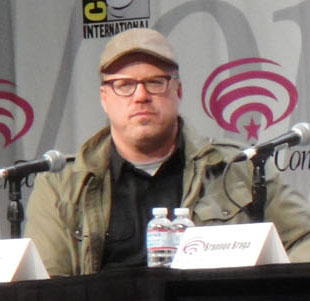A Quote by Nate Silver
I prefer more to kind of show people different things than tell them 'oh, here's what you should believe' and, over time, you can build up a rapport with your audience.
Related Quotes
Humor is so culturally based that when I try to tell a joke as me being a white American, if I tell other white Americans, they'll laugh. If I tell an African American, they might not laugh. In fact, they either might not find it funny, or they might find it offensive, and I didn't mean it to be offensive. So these are the sort of little things that build up over time, just like in a marriage. You know, the little things can build up over time.
Normally classical music is set up so you have professionals on a stage and a bunch of audience - it's us versus them. You spend your entire time as an audience member looking at the back of the conductor so you're already aware of a certain kind of hierarchy when you are there: there are people who can do it, who are on stage, and you aren't on stage so you can't do it. There's also a conductor who is telling the people who are onstage exactly what to do and when to do it and so you know that person is more important than the people on stage.
My movies are always being played on television, I'm very well known and all that stuff - I go all over the world, I have access to many things, many people, many places and it's wonderful. But now I'm at a point where...I thought it was time to show some of it, to show some of my feelings about things and what I preferred at the time. I prefer them still but not to the extent I did at the time.
When someone doesn't show up, the people who wait sometimes tell stories about what might have happened and come to half believe the desertion, the abduction, the accident. Worry is a way to pretend that you have knowledge or control over what you don't--and it surprises me, even in myself, how much we prefer ugly scenarios to the pure unknown. Perhaps fantasy is what you fill up maps with rather than saying that they too contain the unknown.
. . . I felt that making her one-dimensional would be an insult to the audience, and also not as interesting. All destructive people have an inner side to them, and the more three-dimentional your characters are on screen the more compassion you can open up in an audience . . .. To me, that involves the audience more, it stimulates them and asks more of them.
If you're playing a good guy, you show some darkness. If you're playing a dark guy, you show something different, like humor, that will mix it up and hopefully surpass the audience's expectations. What I'm battling all the time is complacency in the audience. I try to bring a little mystery to what might happen because that engages people more.
Once Steve Fuller said that there is this idea that your responsibility as an intellectual is just to speak the truth as you see it. But actually, you should be more appreciative of what needs to be said. I don't think that's ever an excuse to say something you don't believe is true - but sometimes the emphasis has to be different. Well, if I'm talking to an audience of hardline atheists, I'll be trying to unsettle them a bit more, whereas, if I'm speaking to an audience of believers, I'll be giving them more of the pros of atheism. It's about having a sensitivity to context.
And one of the things that's interesting about how they're doing the show is that the audience almost knows more than the characters do in some of these scenes, and the extent of that is unique. So it's grown into a different show in a way. It's sort of grown into a different experience watching it.
Part of the pleasure of giving a reading comes from the rapport between the audience and the poet. I don't want to get mystical here, but there's an energy flow that begins with the poet, and the energy goes out to the audience, and they're energized, and then they return that energy to the poet. As someone standing up there alone, facing these people, I can feel that rapport (or its absence).
The best way to establish rapport with people and to win them over to your side is to be truly interested in them, to listen with the intention of really learning about them. When the person feels that you are really interested in getting to know them and their feelings, they will open up to you and share their true feelings with you much more quickly.
(Human) beings, in Pagan times would kind of like, listen to the stories and, they could kind of, identify - . They were, like, bigger than them and more successful than them or more beautiful, but they had these human fallibilities. Which is like celebrities now. It's like, 'oh, she's in rehab. Oh, she's unfaithful. Oh, they're divorced. Oh, she's anorexic. Oh, he's had a nose job.' You know, whatever it might be.





































